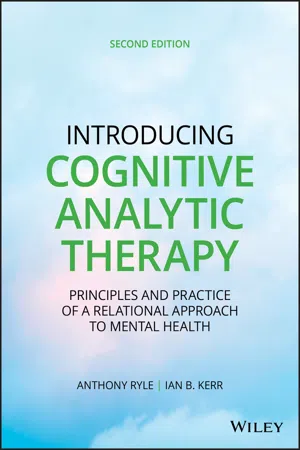
Introducing Cognitive Analytic Therapy
Principles and Practice of a Relational Approach to Mental Health
- English
- ePUB (mobile friendly)
- Available on iOS & Android
Introducing Cognitive Analytic Therapy
Principles and Practice of a Relational Approach to Mental Health
About This Book
Introduces the principles and applications of cognitive analytic therapy (CAT)
Cognitive Analytic Therapy (CAT) is an increasingly popular approach to therapy that is now widely recognised as a genuinely integrative and fundamentally relational model of psychotherapy. This new edition of the definitive text to CAT offers a systematic and comprehensive introduction to its origins, development, and practice. It also provides a fully updated overview of developments in the theory, research, and applications of CAT, including clarification and re-statement of basic concepts, such as reciprocal roles and reciprocal role procedures, as well as extensions into new areas of expertise.
Introducing Cognitive Analytic Therapy: Principles and Practice of a Relational Approach to Mental Health, 2 nd Edition starts with a brief account of the scope and focus of CAT and how it evolved and explains the main features of its practice. It next offers a brief account of a relatively straightforward therapy to give readers a sense of the unfolding structure and style of a time-limited CAT. Following that are chapters that consider the normal and abnormal development of the Self and that introduce influential concepts from Vygotskian, Bakhtinian and developmental psychology. Subsequent chapters describe selection and assessment; reformulation; the course of therapy; the 'ideal model' of therapist activity and its relation to the supervision of therapists; applications of CAT in various patient groups and settings and in treating personality type disorders; use in 'reflective practice'; a CAT perspective on the 'difficult' patient; and systemic and 'contextual' approaches.
- Presents an updated introduction and overview of the principles and practice of cognitive analytic therapy (CAT)
- Updates the first edition with developments from the last decade, in which CAT theory has deepened and the approach has been applied to new patient groups and extended far beyond its roots
- Includes detailed, applicable 'how to' descriptions of CAT in practice
- Includes references to CAT published works and suggestions for further reading within each chapter
- Includes a glossary of terms and several appendices containing the CAT Psychotherapy File; a summary of CAT competences extracted from Roth and Pilling; the Personality Structure Questionnaire; and a description of repertory grid basics and their use in CAT
- Co-written by the creator of the CAT model, Anthony Ryle, in collaboration with leading CAT practitioner, trainer, and researcher, Ian B. Kerr
Introducing Cognitive Analytic Therapy is the definitive book for CAT practitioners and CAT trainees at skills, practitioner, and psychotherapy levels. It should also be of considerable interest and relevance to mental health professionals of all orientations, including clinical psychologists, psychiatrists, counselors, mental health nurses, to those working in forensic and various institutional settings, and to a range of other health care and social work professionals.
Frequently asked questions
Information
Table of contents
- Cover
- Table of Contents
- List of Figures
- About the Authors
- Preface to the Second Edition
- Preface to the Second Edition
- Acknowledgments
- The Structure of the Book
- 1 The Scope and Focus of CAT
- 2 The Main Features of CAT
- 3 The CAT Model of Development of the Self
- 4 The CAT Model of Abnormal Development of the Self and Its Implications for Psychotherapy
- 5 The Practice of CAT
- 6 The Practice of CAT
- 7 The Practice of CAT
- 8 The CAT Model of Therapist Activity and of Supervision
- 9 CAT in Various Conditions and Contexts
- 10 The Treatment of “Severe and Complex”Personality‐Type Disorders
- 11 The “Difficult” Patient, Contextual Reformulation, Systemic Applications, and Reflective Practice
- Afterword
- Glossary
- Appendix 1: Appendix 1The Psychotherapy FileThe Psychotherapy File
- Appendix 2: Appendix 2Cognitive Analytic Therapy (CAT) Competences for Individuals with Personality DisorderCognitive Analytic Therapy (CAT) Competences for Individuals with Personality Disorder
- Appendix 3: Appendix 3Personality Structure Questionnaire (PSQ)Personality Structure Questionnaire (PSQ)
- Appendix 4: Appendix 4Repertory Grid Basics and the Use of Grid Techniques in CATRepertory Grid Basics and the Use of Grid Techniques in CAT
- References
- Index
- End User License Agreement